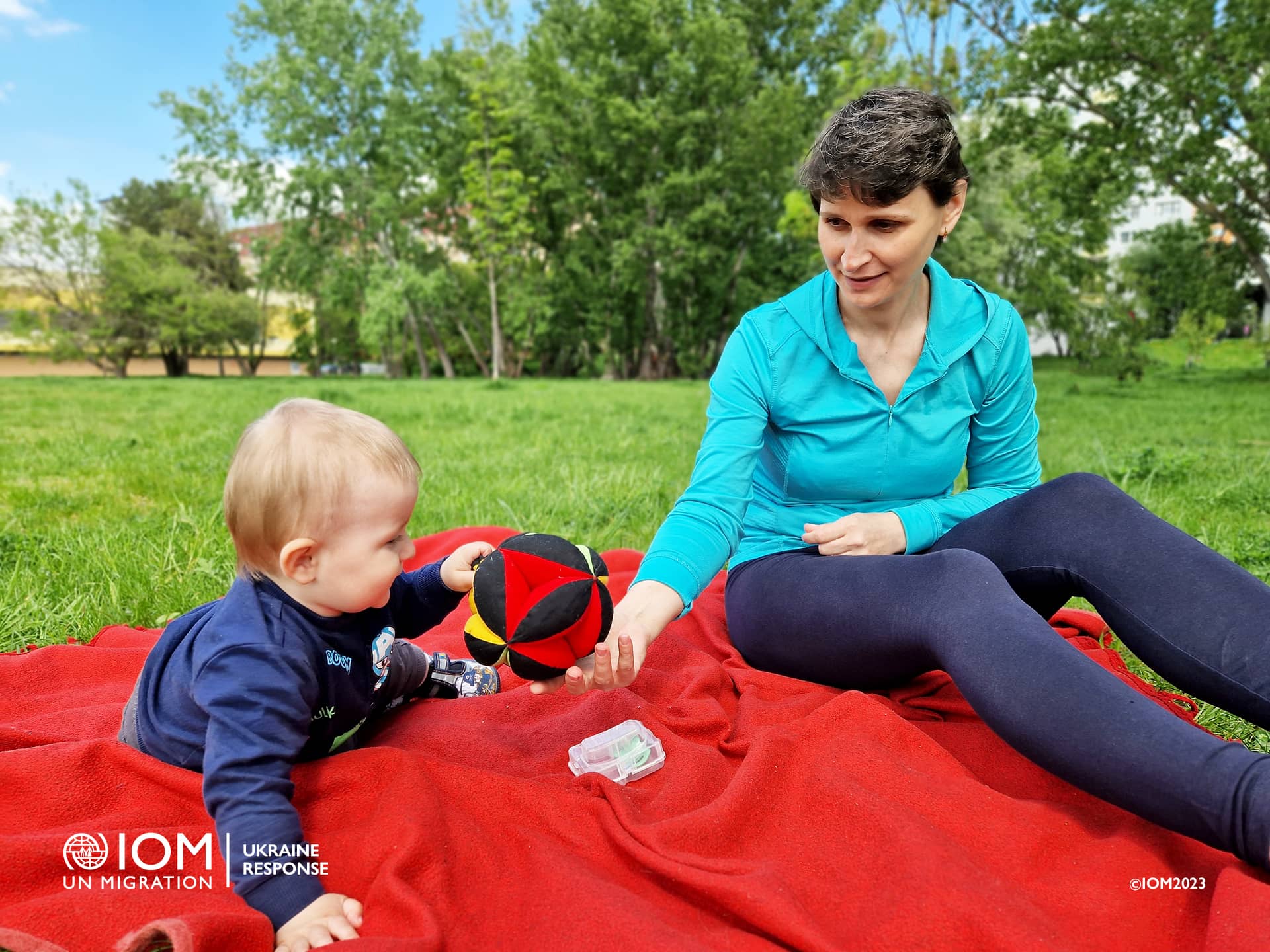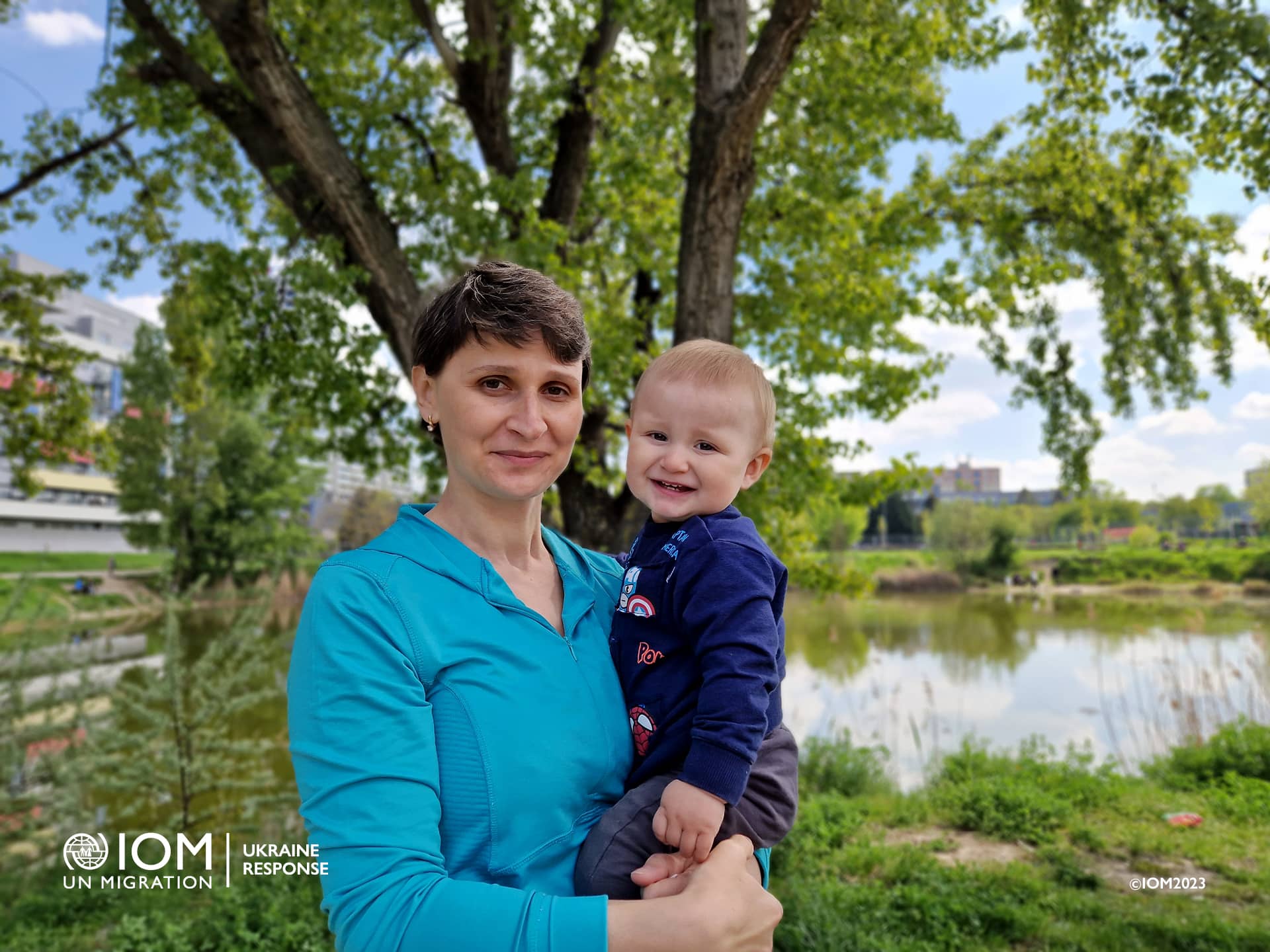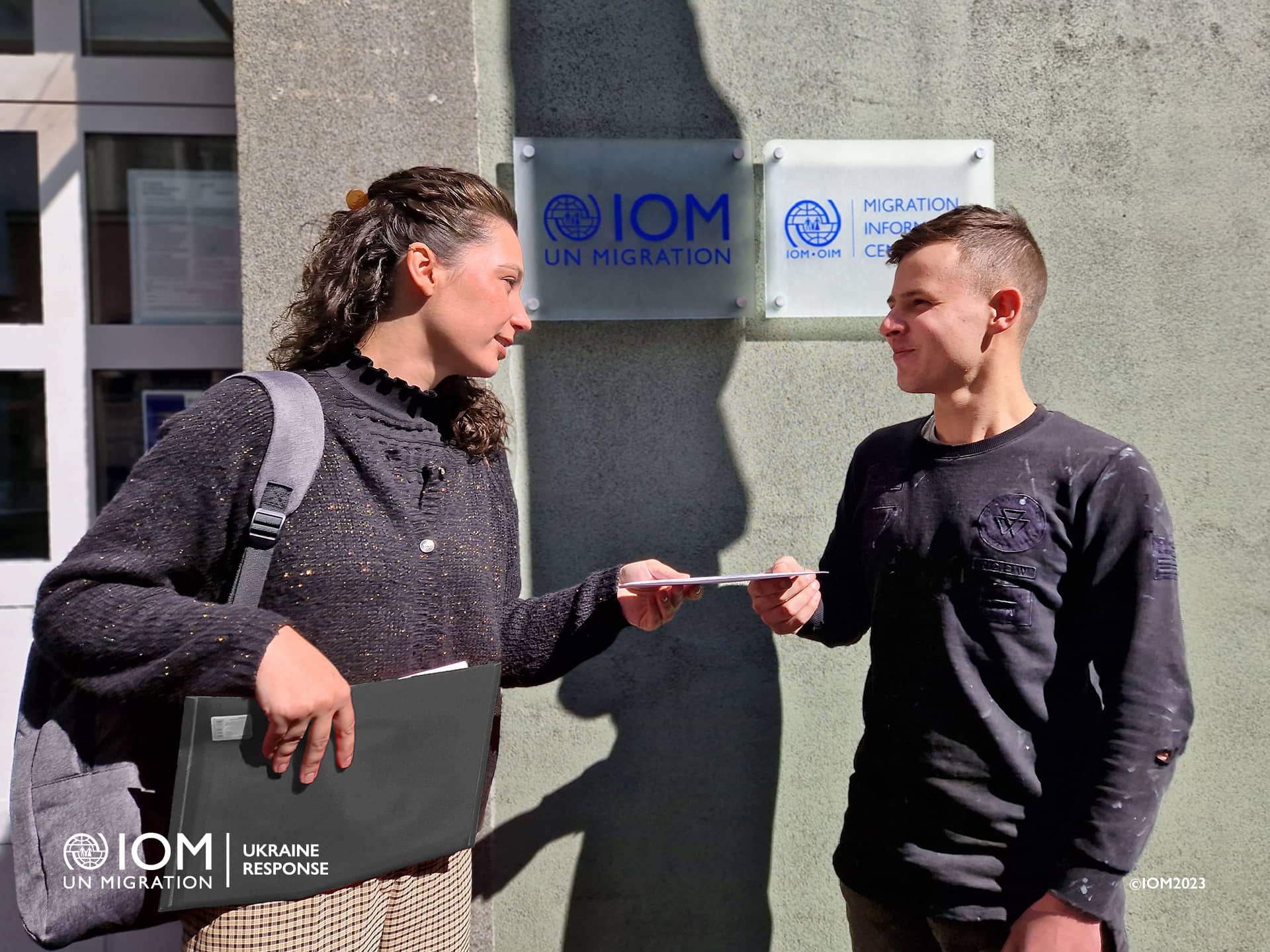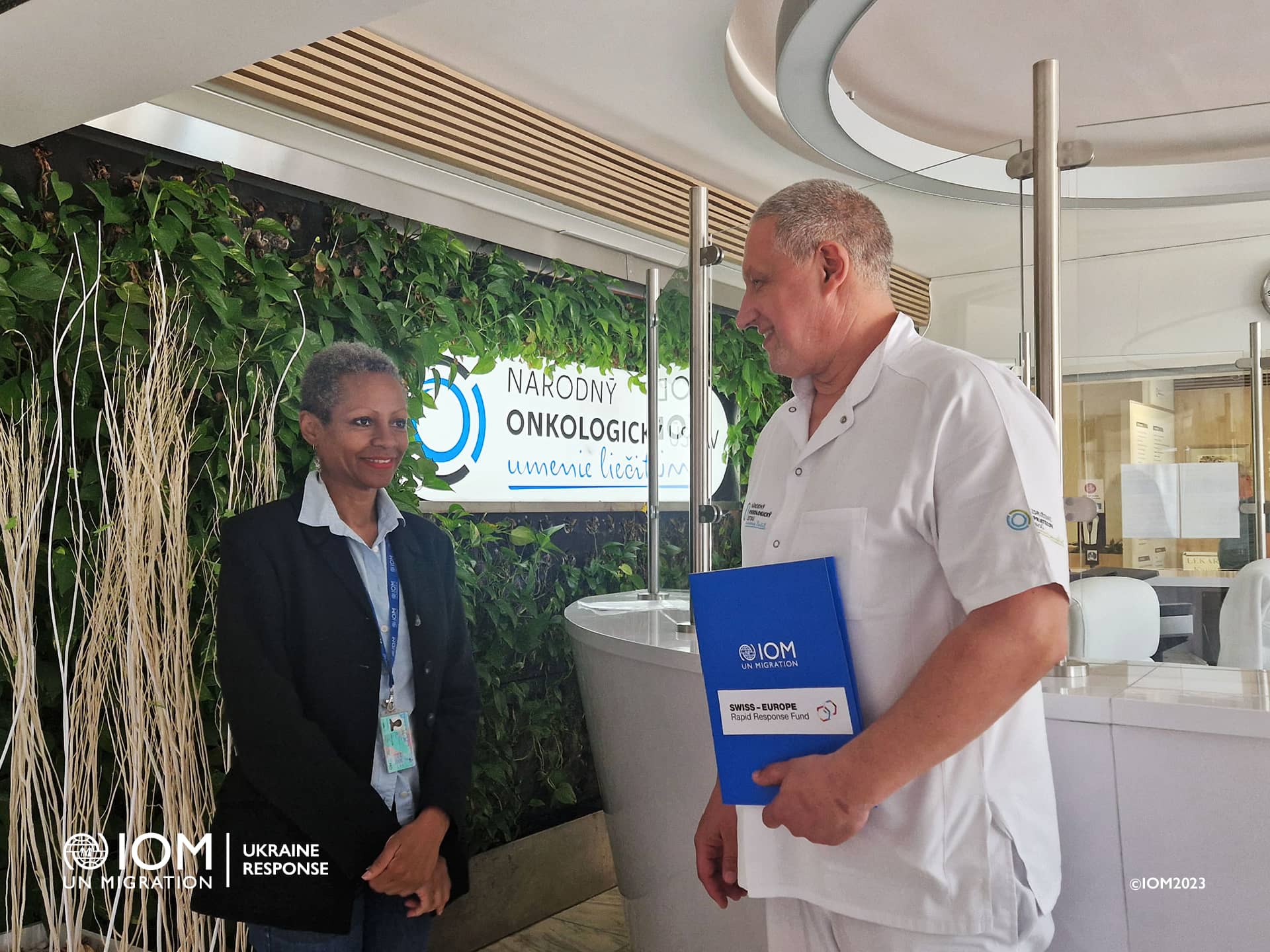“Doctors told me that they no longer have the capacity to help me, and my bed was needed for a patient who still has some hope of surviving. They had no hope for me. They said I have 2–3 months at most,” says Svetlana (41) from Kramatorsk in the Donetsk region of Ukraine, holding her young son Nazar (1) in her arms.
Svetlana is a cancer patient. She found out she had cancer while pregnant with her fourth child. Nazar was born prematurely on 18 February 2022. Five days later, the war in Ukraine started. This is how Svetlana remembers the most dramatic moments in her life. When we met her at the lake, the restless baby boy Nazar was crawling on a blanket and happily playing with his mummy.

Due to the unavailability of medicines, poor medical facilities and frequent shelling of hospitals, Svetlana decided to leave with her three youngest children for Slovakia, leaving her husband and her oldest son, who is attending a police academy, behind. In Ukraine, she was given three months to live, but she has already been living for a year in Slovakia, and her health has visibly improved. Thanks to the help she received in Slovakia from IOM Slovakia and Swiss Agency for Development and Cooperation, she is able to devote herself fully to her three children. Photo © International Organization for Migration (IOM).
Svetlana is a nurse, wife and mother of four children. In Kramatorsk, she worked in a cardiology centre in the intensive care unit and lived a calm life. She and her husband were expecting their fourth child – a son named Nazar. The pregnancy was a surprise; they had not anticipated another child at their age. However, Svetlana felt that her son would change her life, that he would do something special for her. In hindsight, she thinks he saved her life.
In the fourth month of her pregnancy, Svetlana became nauseous, and her stomach began to hurt. “At the hospital, they told me it was nothing, probably nausea related to the pregnancy. I went on with my life, going to work, taking care of my 14-year-old son and 12-year-old daughter”, Svetlana says, describing her experience of symptoms of the disease. However, the pain did not stop, and after four months it forced her to visit the emergency room at Kramatorsk Hospital. Doctors decided that Svetlana had to undergo emergency abdominal surgery. Her son was born that day by caesarean section. During the operation, doctors discovered a tumour and later examinations revealed numerous metastases.
“Five days after the birth, Nazar was taken to a hospital in Kharkiv, where he was put on oxygen machines, as he had come into the world prematurely and could not yet breathe on his own,” Svetlana recalls of her stay in the hospital. This happened on 23 February, one day before the invasion of Ukraine by Russian troops. “I was exhausted after the operation, separated from my child, and with the news of cancer, I could only perceive with difficulty what happened the day after my son was taken to Kharkiv,” Svetlana says, describing the moment when she learned that the Donetsk region was at the epicentre of the fighting.
During the war, hospitals have inadequate equipment, and frequent power outages reduce the quality of treatment for cancer patients
Svetlana was lucky that her operation took place before the invasion began. After the outbreak of the war, Ukrainian hospitals were re-profiled, and many cancer operations were postponed indefinitely to make room for people who had been injured in combat. Health care became overstretched because of the war; hospitals were targeted and patients were discharged. Svetlana, diagnosed with cancer, was also discharged. Doctors gave her three months to live. “So, I decided to undergo treatment on my own,” Svetlana says, telling her story of fighting cancer, with little Nazar in her arms.
Her friends and colleagues at the cardiology centre helped her as much as they could. They scrambled to find her medicines, which were becoming less and less available due to supply shortages. The heaviest fighting at that time was in the eastern part of Ukraine. Svetlana had a tough time getting an MRI, a CT scan or chemotherapy, which was crucial in her treatment. Leaving Ukraine and seeking treatment abroad was the only option for her and many other cancer patients to try to save their lives.
“One day a woman called me. She told me to pack myself and my children and that she would be waiting for me at the Slovak border in two days. She said she had arranged for my treatment. So, I packed my belongings and things for my two older children and my new-born baby in one bag, said goodbye to my husband and friends, and the next day we took the train to Uzhhorod. There I received a second dose of chemotherapy. The nurse who administered it confirmed what the doctor in Kramatorsk had told me – that I only had a little time left,” recalls Svetlana, who did not even have time to say goodbye to her eldest son (20), who is studying at a police academy. At the Slovak border, she met a World Health Organisation (WHO) staff who transferred Svetlana and her family to temporary accommodation in Bratislava’s Kramáre district. Once there, a wave of aid was launched in Slovakia to help the family.
Selfless help from people was another dose of painkillers for Svetlana
Svetlana’s story reached many people who were willing to help her: “I was helped by strangers I had never seen or heard of. They bought us food, brought us milk for my son, brought us clothes and helped us find accommodation. They found an eye doctor at the hospital for my daughter who has eye problems. They organised a trip to a water mill for the children, so I could relax for a while. Sometimes a person came and just hugged me and said everything would be all right. It was as if I had just been given a dose of painkillers. People wanted me to survive,” Svetlana adds.

Svetlana, her son Nazar and two older children travelled almost 2,000 kilometres to receive quality medical care. She is comfortable in Slovakia. She likes the country; the people are nice to her, and her children go to school and have friends here. However, she mourns for her home and Ukraine every day but knows she can only go back as a healthy woman. Photo © International Organization for Migration (IOM).
Svetlana is currently being treated at the National Cancer Institute (NCI), which is providing her with the necessary medication and treatment. “Every patient from Ukraine who comes to the outpatient clinic of the NCI undergoes a basic consultation and is then referred to a specialist outpatient clinic according to the diagnosis. There, the patient undergoes the necessary diagnostic examination, and a treatment plan is issued,” says Dr Jozef Dolník, deputy for health care at the NCI, who comes into contact with oncology patients from Ukraine. Doctors estimate that Svetlana’s treatment will take two more years. So far, it seems to be visibly working, and Svetlana is grateful to be able to spend that time in Slovakia, close to her home.
The help Svetlana received is partly also thanks to the IOM Slovakia, which is a member of the Cash Working Group, together with UNICEF, UNHCR and the IFRC. “Within the group, each organisation provides a different cash element, with IOM Slovakia providing cash assistance to people with disabilities and special needs since 2022,” explains Jasmine Riley, Emergency Coordinator of IOM Slovakia. Svetlana and fifty other cancer patients who cannot afford treatment were selected by a social nurse from the NCI who is available to patients, maps their initial situation and helps them find sources of support. “The social nurse identified among the patients from Ukraine undergoing treatment at the NCI those in need of financial assistance and communicated with them on an ongoing basis with the support of colleagues from the WHO and the IOM,” says Dr. Jozef Dolník, explaining the process of patient selection.
Olexander got the necessary treatment in Slovakia
Olexander, 22, who arrived in Slovakia in March 2022, is also a cancer patient. He lives in the kitchen of his brother’s small apartment in Bratislava, who has lived in Slovakia for a few years. They both work for a company that services elevators in residential buildings. However, Olexander is currently looking for alternative housing, as his brother’s wife is expecting an addition to the family.
In Ukraine, Olexander had a background and a stable job – he worked as an electrical systems installer in Odesa. After the outbreak of the war, however, he lost his job, which was one of the reasons why he decided to follow his brother to Slovakia. The second reason was his health condition, which required professional medical care but was difficult to find during the ongoing armed conflict.

Twenty-two-year-old Olexander took a short break from his morning shift to pick up financial aid from IOM Slovakia which is provided in cooperation with UK Aid. Together with his brother, he works in the elevator service business. Olexander should learn about the next steps in his treatment in the coming days. If he must pay for his treatment, the financial assistance will help him cover the initial costs necessary for successful treatment. Photo © International Organization for Migration (IOM).
“After the war broke out, it was almost impossible to get an MRI, which I needed to have as a cancer patient to set up treatment. The power went out too often for me to have an MRI”, says Olexander about the difficulties of accessing treatment in war-torn Ukraine. In this situation, Olexander decided to come to Slovakia to visit his brother and fight for his life.
Upon his arrival in Slovakia, he was taken in by specialists from the National Cancer Institute (NCI) in Bratislava. Olexander remembers the relatively smooth and easy transfer of his case from the Ukrainian hospital to the NCI. Olexander thus underwent the MRI needed to detect the progression of his cancer and will find out in the coming weeks what form of treatment awaits him. Olexander had visited Slovakia before the war when his brother was living here. “I like Slovakia; you have much cleaner air here than we have in Ukraine. It helps me with my breathing and other health problems I have. Doctors here are also genuinely nice, and people are willing to help”, Olexander says about his impressions of his new home.
For oncology patients, financial help is a chance for life
For Olexander, this assistance means an opportunity to cover basic needs and partially pay for the costly treatment. Because the financial assistance from donors UK Aid and the Swiss Agency for Development and Cooperation is multi-purpose, beneficiaries can use the funds to pay for necessary expenses. “This help means a chance for life for me,” says Svetlana, who is looking after three young children alone.

Jasmine Riley, Emergency Coordinator of IOM Slovakia, hands over DiPocket cards with multi-purpose credit for cancer patients to Dr Jozef Dolník, Deputy for Health Care at the National Cancer Institute. Financial assistance from IOM Slovakia and Swiss Agency for Development and Cooperation gives many people a chance to cover necessary expenses. Photo © International Organization for Migration (IOM).
Dr. Jozef Dolník, Deputy for Health Care at the NCI, emphasises the importance of financial support for his patients, “Existential fears rob our patients of the strength they need for treatment. A lack of resources for decent accommodation, as well as vitamins and special food, medical devices and other expenses beyond those of healthy people, affects the health status of cancer patients from Ukraine. Financial assistance to help them get through the difficult months during chemotherapy or recovering from surgery is of tremendous importance to them and their families, but also to the success of their treatment.” The study The Armed Conflict and the Impact on Patients With Cancer in Ukraine: Urgent Considerations conducted in 2022 by the American Society of Clinical Oncology confirms that cancer patients from combat zones suffer not only from the loss of family structure and support, but also from the stress of war, lack of access to medical facilities, infrastructure, transportation, or lack of basic medicines and medical equipment.
Svetlana: Let’s not give up
When we asked Svetlana where she found the strength to talk about her story, she said she wanted to give women in similar situations hope. Svetlana’s message was clear:
“You have to believe that anything is possible. You can’t sit back and wait for something to happen – you must work on yourself, help yourself and act. You must be kind so that others will be kind to you. I wish that one day I could return to Ukraine, to my home. I wish peace for my homeland and hope for a bright future. Let us not give up.”
IOM Slovakia is assisting Ukrainians in several ways. The cash assistance programme was planned for 400 beneficiaries, and it has outperformed expectations and highlighted the need for this kind of support to people with life-altering challenges in addition to being displaced from their homes. The programme has provided cash assistance for six months to 211 persons with disabilities and 527 persons with specific needs. Among these were 51 cancer patients.
Text and photos: Viktória Križanová, IOM Slovensko
Read more about our assistance in these articles:
Interview: What do migrants looking for work in Slovakia need help with?
The IOM Migration Information Centre is now in all regional towns in Slovakia
How sociocultural orientation can help people from Ukraine adapt to a new environment
With the support of:
 Slovenčina
Slovenčina
 Українська (Україна)
Українська (Україна)
 English
English


